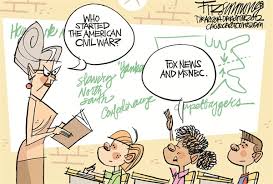With malice toward none, with charity for all, with firmness in the right as God gives us to see the right, let us strive on to finish the work we are in, to bind up the nation’s wounds…
Abraham Lincoln, Second Inaugural Address
There are complaints now of a lack of civility in the United States. I have heard about the lack of civility in periodic outbursts for at least four decades. Despite relentless efforts to stem incivility, we seem to continue to march inexorably towards greater incivility. Why is this the case?
First, we need to know what civility is and why it is important. A dictionary definition would be something like this, “Formal politeness and courtesy in behavior or speech.” But civility must also aim to foster some degree of mutual respect. This mutual respect is important because of a recognition of the inherent human dignity of every human being. This inherent dignity is inherent in our having been made in the image and likeness of God. (Genesis 1:27) This mutual respect nurtures the careful thought and articulate discussion which is fundamental to a healthy democracy. Otherwise, our discussions will remain shouting contests that are to quote Shakespeare, “full of sound and fury signifying nothing.”
As we witnessed in the recent presidential race, however, it is hard in the midst of a bruising political campaign to promote civility. But in the relative calm after the storm, I offer the following rules.
- We should attempt to present only factually verifiable information. Do not assume that all truth rests with your favorite newspaper, news or radio station or blog site. Bias can infect the people you love to read and listen to. Carefully consider your sources. The weaker the review process for the news, the greater should be your skepticism. For example, a blog post is often just an unverified, overheated fictional opinion. Traditional news organizations, whatever their faults, are at least held to a standard of multiple informed sources, etc.
- In political discussions, we should stick as much as possible to substantive issues and avoid ad hominem attacks. We should avoid cheap shots about a person’s economic status, physical characteristics, religion, ethnic or national origins. These have little or nothing to do with arriving at the best policies.
- There is a need to avoid sweeping and largely unverified generalizations about an individual or a group of people. For example, we must avoid statements based on prejudice and little or no evidence such as, “All students at Emory University are liberal cupcakes” or “Half of Trump supporters are deplorable.” Of course, this rule does not preclude balanced criticism based on verified facts and logically valid inference.
There are many consequences to incivility based on factual error, prejudice, personal attack and sweeping, unverified generalizations. As my first principle suggests, if we choose to live in a post fact universe, we begin to lose any common ground on which to debate an issue. If we share absolutely no common ground in facts or principles, then we cannot reason our way to any kind of consensus and we may not respect our differences.
The result: we will be subject to the following kind of views. Many conservatives will hold that all liberals are politically correct elitists relying on their control of universities and the main stream press to promote their agenda of government control of all aspect of our lives, and these liberals relish the mocking of their own country and its special virtues. On the other hand, for many liberals, all conservatives are the sycophants of the wealthy who wish to destroy the environment, abandon the poor, suppress minorities, and eliminate the freedom of the press.
So, the typical form of political discussion today is either a hymn to the choir of the convinced or the squawking of opposing talking heads armed to the teeth with their talking points that aim not at illumination but at cornering their foes in some kind of have you been beating your wife recently logic.
A world awash in harsh, personal rhetoric that is susceptible to adopting a fictional set of facts is a world that needs civility badly in order to allow for some space in which to carefully and thoughtfully explore our differences. It is a world that will denounce efforts to bully or marginalize our fellow citizens. Personal attacks and implied threats in the political or social realms by any person or group must be swiftly denounced.
A rising tide of pride and anger is washing over an uncivil world and labeling opponents as weak or stupid or deplorable. Once the enemy is negatively labeled, we can feel justified in acting with greater impunity against their fundamental human dignity. Our prideful certainty in our own views is constantly reinforced by group think from our favorite sources of opinion and news. A key antidote to such thinking is a humility assumes our own inherent bias and weakness. It allows us to be charitable to our opponents. As Pope Francis has noted, “humility saves man: pride makes him lose his way.” Such humility is not a call to relativism or a call to forgo a vigorous defense of one’s causes. Rather, humility can lower the heat in our discussions and allow us to hear one another and locate the good in our opponents.
So, give civility a chance this coming year. For my part, I will consider thoughtful positions by conservatives and liberals and all points in between in politics and in my Church. I will try not to demonize those I disagree with. With civility, humility, and good faith, we may in Lincoln’s words “do all which may achieve and cherish a just and lasting peace among ourselves…” Not a bad goal.



Awesome Site. Really enjoyed reading.